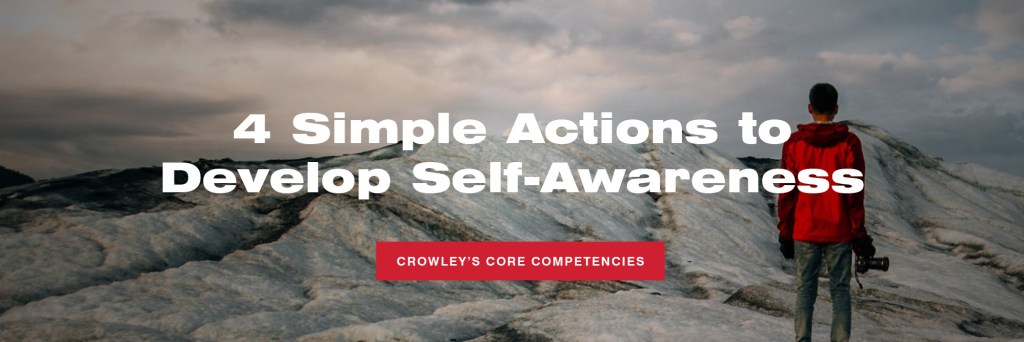
By Jesus Acuña
Regional Manager, People Development & Learning
What is it about leadership competencies that make them such a valued concept across organizations? Simply put, competencies are sets of skills and behaviors that allow people, teams and organizations to achieve results more effectively. Essentially, they are the ingredients of success at work and self-awareness it’s one of them.
Some of the competencies proven to elevate leadership and results in organizations include collaboration, being action-oriented, the ability to manage ambiguity, self-awareness and continuous development. In fact, these align with Crowley’s core competencies for high performance.
For me, self-awareness has been an area of focus since I began working in a professional setting. Early in my career, I would carry on without really taking the time to even think about this concept. I wouldn’t hesitate to respond, react and take action without applying any sort of filter. If I thought it, I’d say it. If I felt a certain way, I’d react then and there. The uncomfortable part of this is I had no clue about the effect this was having on relationships, perceptions and opportunities to grow. Fast forward to today, a time where I can say I’ve learned from countless mistakes. Like many people, I am now being challenged in new ways while working from home for an extended period due to COVID-19 safety measures.
Daniel Goleman, the author of the best-seller, “Emotional Intelligence,” describes self-awareness as the ability to understand your own emotions and their effects on your performance. I would also include that it means being aware of our strengths, limitations, and interests and how those factors play into our thoughts, behaviors, and thus, our results. This competency can help us make smarter decisions than those we’d make solely based on impulse.
Now, since we can’t just flip on a self-awareness switch, like anything else, developing this competency takes time and commitment. The following are some of the behaviors and actions I’ve learned to apply over the last decade that have worked well for me.
- REFLECT
Reflect on your behaviors and how they may impact those around you. Articulate the causes behind your feelings and moods - LEARN
Spend time learning your strengths, weaknesses, opportunities and limits. Proactively ask for feedback from people that won’t hesitate to be honest and direct. When you feel criticized, look at it as an opportunity to learn, rather than taking offense. - PAUSE
Just pause. Take a moment to pause and think before speaking or reacting whether the situation is good or bad. It’s better to delay a reaction than to go the wrong route due to not taking the time to think thoroughly about its potential impact. This can be during a conversation, when about to make a significant purchase or even when you’re about to hit the send button when replying to an irritating email. - EXPLORE
Explore the “why” in challenging situations. Ask yourself why the other person may feel the way they do, what they may be dealing with that you don’t see, or why you feel differently than they do.
Over the years I’ve learned a lot of lessons on the importance of this competency and I’m still learning. I’ve been able to increase my self-awareness to the point where it now benefits my decisions, quality of relationships and overall performance.
In practical terms, this competency applies both in the office and in a remote work setting. Over recent weeks working from home, I wasn’t initially aware that my interactions with people, productivity and focus were being affected by changes in routine. At first, I would connect with co-workers via audio-only calls. I later realized that turning on my video kept me more focused on the conversation and added a more personal experience in spite of not being able to meet in person. From a personal perspective, not being able to go to the gym and having my kitchen just steps away made it dangerously easy to be a frequent visitor. Can you relate? It took a few days before I started to reflect and try to make an adjustment to my environment, search for home workout videos, take walks, plan my meals and an array of other small changes that got me back on track.
Self-awareness also includes measuring where you stand when it comes to the competencies used in your organization. What works for you? There is no exact formula for everyone. The key is taking the time to apply these and other actions as part of your development.